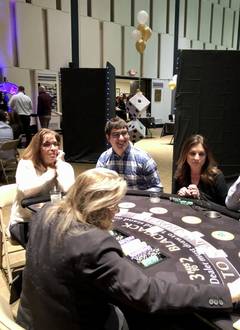Kol Nidrei 2023: High Eyes
09/26/2023 11:07:05 AM
Rabbi Ben Goldberg
| Author | |
| Date Added | |
| Automatically create summary | |
| Summary |
Exactly 50 years ago today, the State of Israel faced an existential threat. While the KTI community assembled in this very room to observe Yom Kippur, including some people who are still with us today, Israelis faced their own “who will live and who will die” moment. In a surprising move, Israel found itself facing simultaneous attacks from Syria in the north and from Egypt in the west, an attack that caught most Israelis by surprise, and not only because it took place on Yom Kippur. After the euphoric and unexpected victories of the Six Day War six years earlier, many Israelis felt invincible, or, at least, that various geopolitical considerations made another attack on Israel an unwise move on their enemies’ part.
Galia Miller Sprung is an American-born Jew who made aliyah to Israel in 1970, in those heady years between the wars, and became a founding member of a moshav in the Jordan Rift Valley. In a recent essay, she recalls how the quiet of Yom Kippur was breached that year by two low-flying fighter jets whizzing overhead as she changed her daughter’s diaper, and how her husband and his brothers quickly left to join their reserve units. “Israelis were strong and invincible and always on alert,” she remembers thinking. “I wasn’t afraid.”
Galia returned to her start-up moshav, by then transformed into a military base. She spent the war caring for the community’s children and working in the fields and kitchen, the moshav’s labor force greatly reduced by reserve duty. At least two members of the moshav were killed in action during the war, including Galia’s friend Ezra. In addition to these losses, Galia also lost her naïveté about the invincible Israel she thought she had moved to. “The blind trust,” she writes, “that I had had in Israel’s leaders was gone, while my determination to build up the moshav and raise my family there was strengthened.”
Israel eventually beat back the attacks, and the ensuing diplomacy set in motion a process that led to a peace treaty with Egypt, which has held for over four decades. But the trauma of war–the vulnerability it revealed, the trust in leadership it eroded, not to mention the over 2600 soldiers who fell–remains in Israel to this day. Israel’s intelligence and strategic failure cost it dearly, and Israelis continue to debate who was responsible. The recent Hollywood film Golda, in which Helen Mirren portrays then-Prime Minister Golda Meir, is part of this re-appraisal. The film portrays the smoke-filled rooms where Golda and other Israeli leaders managed the war, militarily and diplomatically. The film subtly attempts to shift some of the blame for the war’s failures away from Golda and toward other Israeli military leaders. Especially as archival documents come to light, the debate will continue, even 50 years on.
One of the key failures of the war came in the interpretation of intelligence in the days prior to the war’s onset. Signs of war that in hindsight seem obvious were dismissed in the moment by Israel’s military establishment, which retained its fundamental, incorrect assessment that Egypt and Syria would not go to war. Israelis paid a steep price for their protectors’ arrogance.
As a result of this failure, Israeli military intelligence established a unit known by the Talmudic phrase ipcha mistabra, meaning, the opposite is more reasonable. This unit’s purpose is to challenge the conclusions of the intelligence establishment, questioning assumptions and considering less-likely scenarios. Even when the mainstream conclusion remains, this kind of built-in challenge disrupts group-think, arrogance, and other forms of analytical laziness, particularly when the stakes are high.
###
Al cheit shechatanu lifanecha b’aynayim ramot. For the sin we have committed against you with haughty eyes. Among the many things which we confess on Yom Kippur is the sin of arrogance. The liturgy borrows the phrase aynayim ramot, literally high eyes, from the Book of Proverbs, where it leads a list of seven behaviors that God hates. To have high eyes means to look down on others, to see yourself as better than others for no justifiable reason.
The Jewish philosopher Rabbi Sol Roth suggests that this kind of moral arrogance–thinking of oneself as better than others based on some standard such as wealth, intellectual achievement, social status and the like–stems from one of three misconceptions. The first misconception lies in choosing the ultimate standard by which a person should be measured. An arrogant person might mistakenly think that wealth or social status is of ultimate value, and then judge themselves highly on that scale. The second misconception lies in mis-assessing one’s own attainments relative to those of others, even on the correct scale of value. The third possible error is to make an incorrect jump from “My actions are better than another person’s” to “I am a better person than someone else.” If human life is of ultimate and unlimited value, then we actually have no way to say that one person is absolutely better or more valuable than another, least of all ourselves. Any of these mistakes can lead us toward an arrogant worldview.
Likewise, the feminist philosopher Robin Dillon suggests that arrogance emerges from a lack of both respect for others and self-respect. “Arrogance is not a merely irritating bad habit,” she writes. “It is a corrosive and debasing vice that thwarts human flourishing and blights human community.” Arrogance stems from a presumptuous or unjustified sense of one’s own status or authority, which leads to a dismissal of other people and their concerns and interests. Failing to see ourselves as an equal among equals, with the moral responsibilities that entails, is actually a failure of self-respect, in that we have failed to understand our place relative to others properly. Arrogance, then, trades self-respect for self-esteem which, Dillon suggests, is the root of all vice.
One consequence of arrogance, then, is a desire to win at all costs, to show one’s own superiority over others. As psychologist Dr. Susan Krauss Whitbourne writes, arrogant people are “constantly vigilant for opportunities that allow them to edge out [those] they perceive as competitors. Because they value winning above all else, they’ll also be likely to enter into arguments; … The arrogant … are primed not only to win, but to see themselves as deserving of winning.”
Arrogance can also stem from insecurity. In the absence of an internal sense of self-worth and self-confidence, sometimes people compensate by acting arrogantly as a coping mechanism. If I act like I know everything worth knowing, we might think, then no one will realize that I actually don’t know much of anything.
The sages of our tradition took care to guard themselves against arrogance. Of course, the great Sages of Judaism saw the study of Torah and the observance of mitzvot as of utmost value. But at the same time, they were careful not to let that lead them to a sense of arrogant superiority over others who were not Torah scholars. The Talmud reports that the great sages in the academy of Yavneh would say: “I, a Torah scholar, am God’s creature and my fellow, who engages in other labor, is God's creature … I rise early for my work and he rises early for his work. And just as he does not presume to perform my work, so I do not presume to perform his work. Lest you say: I engage in Torah study a lot, while he only engages in Torah study a little, so I am better than he, it has already been taught: One who brings a substantial sacrifice and one who brings a meager sacrifice have equal merit, as long as they each direct their heart towards Heaven.”
Our Sages here model a healthy self-confidence that does not slide into arrogance. They created sprawling works and houses of study that testified to the importance they attributed to Torah study and those engaged in it. They knew who they were, and to what pursuit they had dedicated their lives. But at the same time, they checked the tendency to think of themselves as better than anyone else. They emulated Hillel, who exhibited patience toward deliberately provocative requests from non-scholars, rather than Shammai, who reacted to them with irritability and dismissiveness. It is possible to assert a belief or a value without arrogance, so long as that assertion is done with a humble sense of one’s place and respect for those who may differ. Here, too, the sages associated with Hillel are our model. Famously, they would teach the opinions of opposing scholars before teaching their own.
###
It is with this in mind that, 50 years out from the Yom Kippur War, please allow me to turn your attention to the crisis facing Israel today. First, a few caveats. I could well be accused of arrogance for expressing an opinion about what’s going on in Israel, from the comfortable position of not being Israeli and not living in Israel. And those are certainly relevant factors. I as a Diaspora Jew do not vote in Israeli elections, and rightly so. But at the same time, Israel disclaims being simply a state of all its citizens, and instead claims to be the nation-state of the entire Jewish people. This means that, as Diaspora Jews, we cannot relate to Israel the same way that we relate to Italy or Japan. Rather, we Diaspora Jews have both the right and the responsibility to express informed opinions, to defend Israel from unfair criticism, and to use our resources to help shape Israel into the kind of Jewish state we’d like to see in the world. To be sure, there are limits, and reasonable people can disagree over where they are. But it is not arrogant for us to engage in activism or express an informed opinion about a state that claims to act on our behalf.
I also know that the very subject of Israel provokes strong feelings in our and many other Jewish communities. For some of us, Israel is a beacon of Jewish safety and flourishing, and it is not for us to question whatever it might take to secure Israel from real threats to its existence. For others, Israel presents a challenge to their sense of Jewish values, including a concern for the marginalized and powerless of any background, and treating wherever we find ourselves as our home. Still others may be somewhere in the middle, or not particularly engaged around Israel, or unsure where they stand. I am open to engaging with all of these points of view, and if something relating to Israel is on your mind, please–you guessed it–bother me. I’d love to chat about it.
But, all of that said: I found myself choking up as we recited the prayer for Israel last week. For those who may not have followed the events of this year closely, let me try to explain why.
When a new government came into power in January, a government that depends on previously marginal, far-right figures for its existence, it proposed a thorough set of reforms to the power of the nation’s Supreme Court. Israel does not have a written constitution, and its parliamentary system gives by definition both a legislative majority and executive power to the governing coalition. This means that the only check on the majority’s power is the court.
The reaction to these proposals was swift: increasingly large and diverse protests every Saturday night since January in Israel’s large cities, with people filling the streets by the tens and even hundreds of thousands. For many Israelis, particularly secular ones, the court embodies their vision of democratic values and human rights, and helps them feel that a powerful entity within the state protects their values and enables them to feel at home. The protests grew wider and wider, with a broad, mainstream range of people expressing their disapproval, all while waving Israeli flags and singing Hatikvah.
There are many people, of course, who support the reforms. They see the court as having seized too much power for itself relative to that of the people’s elected representatives, especially after the court granted itself the power of judicial review of legislation in the 1990s. In this view, the court is the last bastion of a discredited, shrinking elite that cannot win at the ballot box so instead tries to win at the courthouse. They look at a court that still overwhelmingly reflects a secular, Europe-oriented worldview that has little in common with the religiously-traditional, Middle-East oriented set of values held by many Israelis.
Push is increasingly coming to shove, with the Supreme Court set to rule in the coming months on the first piece of the judicial reforms that narrowly passed over the summer. Israel is potentially facing a constitutional crisis, where an arm of the state such as the police or the army would need to decide whether to obey the judges or the politicians. I sure hope matters do not come to that.
I’ve tried my best to briefly summarize the issue, and there are many more factors in play here. What is clear is that something fundamental to the nature of the country is at stake: the delicate balance between Jewish and democratic, between the prerogatives of the majority and the rights of the minority, between being a country that, at least once, aspired toward European-style secular democracy and one that must also operate in the realities of the Middle East, and so on. Most concerning is the way that this issue has torn Israelis apart, dividing families and friends. Even some who would support certain reforms to the Supreme Court now say that this is not the way, that the price to Israel’s social fabric is too high.
But on this Yom Kippur, I’d like to suggest what this existential crisis and the one 50 years ago have in common is arrogance. Then, it was the arrogance of believing in Israel’s military invincibility. Today, it is the arrogance of believing that one part of Israel’s very diverse society can impose itself totally onto the other.
The people of Israel are not merely diverse, but include populations whose values and lifestyles are fundamentally opposed. The task facing Israeli society is to find ways to balance the needs of all of these different groups, giving each enough to feel that the country can make space for them, but without forcing their values onto others.
For example, take the issue of public transportation on Shabbat. This summer, a new light rail line finally opened in greater Tel Aviv, and like most other public transportation in Israel, it does not operate on Shabbat. For some Israelis, this is a fundamental feature of what it means to be a Jewish state: to have public space governed by the rhythms of Jewish time. For other Israelis, this is a real imposition of religious observance, forcing them to use other, more expensive means of transportation on their one day off. I don’t have a magic solution to this fundamental clash of worldviews, between those who see what other Jews do on Shabbat as a matter of cosmic significance and those who see it as nobody else’s business. But what I do know is this: the answer isn’t to keep pushing until the day when you can finally impose your values onto everyone else, until you can finally make everyone else just like you. That is arrogance.
What concerns me the most right now is the arrogance of those who would fundamentally change Israel’s system of government with a simple-majority legislative vote. What concerns me most right now is those who are content to let democracy be merely a set of procedural rules about elections, and not also a value system based on equality, tolerance, and compromise, which are also Jewish values. What concerns me most right now is the open agenda of those pushing judicial reform, who want to clear the way to turning Israel into a religiously fundamentalist country, where women are literally pushed to the back of the bus, where Orthodox Judaism becomes even more entangled with state power, where the LGBT community is forced back in the closet, and where non-Jewish minorities are second-class citizens by law.
Yes, there is arrogance to be found on the other side of this debate too. The Court, and the establishment of which it is a part, could better reflect Israel's diverse population, in particular its population of Mizrahim, or Jews of Middle Eastern origin, who have long been subject to discrimination and condescension on the part of the Ashkenazi elite that established the country . It could act with greater understanding that the principles of liberal democracy may look different when applied to Israel and its diverse populations. There is a reasonable case to be made for certain, more modest judicial reforms, and certainly for greater clarity and consensus about the balance of powers.
What might get Israel out of this crisis is less arrogance, and more humility; less shouting and more listening; less unilateral change and more compromise; less “The Egyptians will never attack” and more “ipcha mistabra”--what if we got this wrong?
As the American-Israeli writer Yossi Klein Halevi put it, reflecting ten years ago on the legacy of the Yom Kippur War: “No Jewish group – political or cultural – has all the answers. Each camp has grasped something true, essential, about our predicament; each speaks for a legitimate Jewish value…Perhaps the most enduring lesson of the Yom Kippur War, then, is the need to lower our guard against each other and listen to competing insights.”
As for us, this is the time to draw closer to Israel, not to back away. It’s the time to pay more attention, to read widely, to stay in touch with friends and relatives in Israel, to show up for the Israel-related speakers we will host this year at KTI. The first event is a book talk with Oren Kessler on Tuesday, October 24. Whatever ends up happening in Israel will happen in our name, with or without our involvement. So we might as well pay attention, with an open mind and heart, and a sense of our own values and priorities as Jews.
I conclude with the words of the Israeli poet Yehuda Amichai:
From the place where we are right
Flowers will never grow
In the spring.
The place where we are right
Is hard and trampled
Like a yard.
But doubts and loves
Dig up the world
Like a mole, a plow.
And a whisper will be heard in the place
Where the ruined
House once stood.
Fri, October 17 2025
25 Tishrei 5786
Photo Gallery
Photo Albums
Upcoming Events
-
Tuesday ,
OctOctober 21 , 2025Women's Rosh Chodesh Group
Tuesday, Oct 21st 12:00p to 1:30p
New Women's Rosh Chodesh Group Tuesdays, 12:00-1:30pm Gather with Cantor Sklar and KTI friends at the start of each month of the Hebrew calendar to learn about the themes and traditions of the coming month. Learn from each other, learn more about each other and better understand the women within our tradition. Enjoy music and lunch together! Please a dairy or parve lunch to enjoy at noon, followed by the discussion at 12:30pm. KTI will provide drinks and dessert. RSVP Appreciated -
Wednesday ,
OctOctober 22 , 2025Rabbi, May I? Modern Responsa
Wednesday, Oct 22nd 10:00a to 11:30a
Wednesdays, 10 - 11:30 AM, KTI Library Ever since Abraham’s famous argument with God, Judaism has been full of debate. Moses and Korah, David and Nathan, Hillel and Shammai, the Vilna Gaon and the Ba’al Shem Tov, Spinoza and the Amsterdam Rabbis . . . the list goes on. No wonder that Judaism cherishes the expression machloket l’shem shamayim, “an argument for the sake of heaven.” Beyond their historical importance, what makes these disputations so compelling is that nearly all of them, regardless of their epochs, are still being argued. The parade of characters spanning three millennia of biblical, rabbinic, and modern disputation reflects the panorama of Jewish history with its monumental political, ethical, and spiritual challenges. This series will examine Jewish responses to exile from the biblical period to our modern day. Considering texts from all genres of Jewish literary creativity, we will explore how the realities and iterpretaions Join as we re-open these timeless debates that lead us to the core of 3,000 years of Jewish conversation. • Justice: Abraham vs. God (October 19) • Holiness and Authority: Moses vs. Korah (November 9) • Inclusion: The Five Daughters vs. the Twelve Tribes (November 30) • Accountability and Morality: David vs. Nathan (December 21) • Resistance: Ben Zakkai vs. the Zealots (January 18) • Law: Hillel vs. Shammai (February 15) • Spirituality: The Vilna Gaon vs. the Baal Shem Tov (March 15) • Boundaries: Spinoza vs. the Amsterdam Rabbis (April 19) • Religious Evolution: Geiger vs. Hirsch vs. Frankel (May 10) • Zionism: Herzl vs. Wise (May 31) -
Wednesday ,
OctOctober 22 , 2025Wrestling with God
Wednesday, Oct 22nd 8:00p to 9:30p
Wrestling with God Wednesdays, 8-9:30 PM Congregants’ homes TBA We need to talk about God. And about how we talk, and don’t talk, about God. It’s a big topic, maybe the biggest. This offering invites adult learners into compassionate inquiry, deepening their relationship to Jewish text through collective exploration. Using the album s*ngs ab-ut g?d [https://open.spotify.com/album/6JEY2AN6awAxNfWwmXX460] by Jewish educator Eliana Light as a starting point, this series blends music, Hebrew text study, and open-ended questions to help participants examine their own connections to the divine. This is sacred work. It’s not about getting it right. It’s about showing up with curiosity, humility, and a willingness to join the long lineage of Jews who wrestle with God. Each session stands alone, but we’d love to have a consistent group as much as possible. Dates: September 10: skyman October 22: shadows November 19: in the silence December 10: if only January 21: lead me back February 11: three steps March 11: beyONEd April 29: the mountains May 20: the name June 17: I rise -
Thursday ,
OctOctober 30 , 2025Coffee with the Rabbi
Thursday, Oct 30th 8:00a to 9:00a
Start your morning with some caffeine and casual or meaningful conversation! Join Rabbi Goldberg for a Coffee Chat! Stop by Rye Ridge Starbucks any of the following Thursdays, between 8-9am: June 12 and 26 July 10 and 24 August 7 and 21 September 4 and 18 October 16 and 30 November 6 and 20 December 4 and 18 -
Saturday ,
NovNovember 1 , 2025Dror Israel Shabbat
Shabbat, Nov 1st 11:30a
Dror Israel Shabbat Dror Israel’s Mirit Sulema, along with two leaders of the Arab Youth Movement NOAL, Tal Tunik and Shadi Habiballa, will speak during a Kiddush lunch about their important work with Arab Israeli youth and bringing Jewish, Arab, and Druze youth together. Saturday, November 1st, approx. 11:30am KTI Social Hall "We eat together, laugh together. We talk about what we think of each other, and what will help bring peace.” RSVP Appreciated
Privacy Settings | Privacy Policy | Member Terms
©2025 All rights reserved. Find out more about ShulCloud






